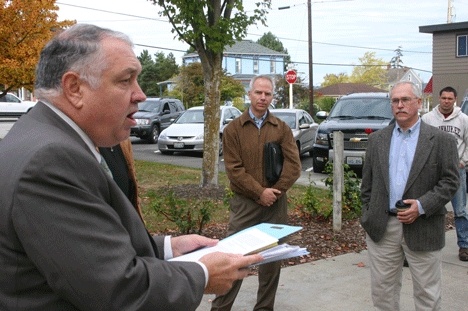The failure of the latest effort to develop the 750-acre former Trillium Woods property north of Freeland has environmentalists daring to dream again.
“Everybody I’ve talked to, their eyes get big and they start jumping up and down,” Marianne Edain of Langley, a founder of the Whidbey Environmental Action Network (WEAN), a local environmental watchdog group, said Monday.
“I think there’s a glimmer of hope,” Edain said. “I call it the once and future forest.”
The most recent development plan collapsed when an Arlington firm defaulted on two loans. On Friday, the bank that held the loans acquired the property at public auction.
Bank officials say they plan to sell the land.
Edain said she has been in touch with a number of Whidbey Island organizations that would prefer to protect and preserve the property for recreational use.
She said she has talked to the Whidbey Camano Land Trust, the island chapter of the Backcountry Horsemen of Washington, the M-Bar-C Ranch, Island County Parks and other interested parties.
“We’re interested in any large piece of property on Whidbey and Camano,” Patricia Powell, director of the Whidbey Camano Land Trust, said Tuesday. “We’re looking into it. Definitely, the whole piece is of interest.”
The Freeland Water and Sewer District also has its eye on the rights to 80 aces of the property in the event that a long-awaited plan for a sewer system materializes.
In all cases, money is the major issue, but Edain said that at some point state and federal grants may become available.
“We need to know the bank’s bottom line, and its time line,” she said.
Shoreline Bank, holder of two notes in default from the previous owner of the property, submitted the only bid for the property at last week’s sale, the minimum of $3,477,344.
In the default auction, the bank bid on the property in conjunction with two other banks, North County Bank of Arlington and Coastal Community Bank of Everett.
About 10 people attended the auction on the steps of the county Administration Building in Coupeville on Friday morning. The sale was conducted by Everett attorney Thomas D. Adams.
The banks were given 28 days to determine what to do with the property before a second auction would continue.
Jeff Lewis, president of Shoreline Bank, said the bank is looking to sell the property.
“There’s been a fair amount of interest in it, so we’ll see,” he said.
The property, known most recently as Estates at Whidbey, is west of Highway 525 about a mile north of Mutiny Bay Road. It was being developed by Dogwood Whidbey Development, created by Jesse Molnick and managed by The Molnick Group, his development firm based in Arlington.
Adams said Molnick was in default on two loans, one for about $3.3 million, the other about $1.6 million, both from Shoreline Bank.
Molnick had proposed construction of planned residential developments, called PRDs, to include clustered housing on three 50-acre parcels of 10 building lots each, a 12-lot PRD on about 60 acres, and a 5-lot PRD on about 24 acres.
Some of the PRD permits were obtained by Molnick from the county, but never recorded, Adams said, so the property couldn’t be auctioned off in sections.
The area has a boisterous history that dates back more than
20 years.
In 1988, the property was the site of controversy when Trillium Corporation of Bellingham, owners at the time, clearcut the area.
Protesters gathered at the property and blocked an entrance in an attempt to stop the logging. It was one of the first major campaigns of WEAN, which helped to organize the protest.
“We have a lot of sweat in that property,” Steve Erickson, another WEAN founder, said at the auction Friday.
Jerry Lloyd, a member of the local Backcountry Horsemen chapter, said Monday he was sorry Molnick’s project failed, because the group had worked long and hard to convince the developer to permit horseback riding on the trails that crisscross the property.
Lloyd said there are “historical and emotional” factors regarding the trails, many of which were established by founding family members of the M-Bar-C Ranch.
“Now we’ll probably have to start over with a new ownership group,” he said, while holding out hope that the property will stay undeveloped.
“There’s not going to be another 750-acre parcel to come up for sale on the island,” Lloyd said. “It’s not going to happen.”
Edain said karma may be on the side of the environmentalists this time.
“A number of owners have gone down the tube trying to develop this property,” she said. “I like to think that there’s a jinx on it, allowing it to be protected.”



